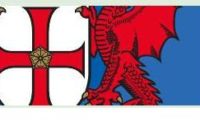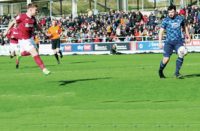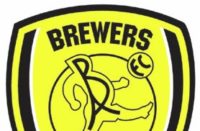PHIL Parkinson was never the silkiest player, nor the most gifted. He often saw the impossible pass, but that didn't mean he could play it.
As Alan Pardew, his manager at Reading once joked: “Technically, Phil wasn't too great. There was a time during my tenure when we wouldn't even give him the ball, but it didn't matter – he went and won it for himself anyway!”
And that, in a nutshell, is why Reading fans will always love him.
Determined, bloody-minded and intelligent to boot, Parkinson patrolled the Royals' midfield for over ten years, tackling, chasing, harrying and hounding.
Through relegation, promotion and the upheaval of moving from Elm Park to the Mad Stad, ‘Parky' was the rock upon which all Reading fans hung their hats.
That's why, in 2007, he was voted the club's second-greatest player behind the mercurial Robin Friday.
Why in 2003, fans protested outside the stadium until chairman John Madejski awarded him a testimonial.
Why Graeme Murty, who spent the first five of his 11 years at Reading with Parkinson, counts the midfielder as the single greatest influence on his career.
“Phil is the reason I was at Reading as long as I was, and why I am the person that I am when I play,” said Murty, now retired.
“At Reading he was always the first on the pitch and the last off it, and his performances set the example for what was expected when you pulled on a Reading shirt. He is a legend there and rightly so.”
Having joined from Bury in 1992, Parkinson would eventually play more than 400 games for Reading, winning promotion from the old Division Three in 1994 under Mark McGhee and again in 2002 under Pardew.
He was player of the year twice running and by rights should have played in the Premier League after the Royals finished second to Middlesbrough in 1995.
However, with the top flight shrinking to 20 teams, only one team went up automatically that season, consigning Reading to the play-offs where they were beaten 4-3 by Bolton at Wembley.
Parkinson eventually left the Madejski in 2003, but only after completing all his coaching badges and an Open University degree in social sciences.
It was an academic cocktail that appealed to Colchester United owner Peter Heard.
“Someone in the game with connections with Reading said to me that if I was looking for a manager I could do a lot worse than Phil Parkinson,” recalls Heard, who stepped down in 2007.
“I got in touch on the Friday and on the Monday his CV arrived as one of 87 applications. We got down to a list of four, had our interviews and I was attracted to his enthusiasm. We thought we would be a good club for him to achieve something.”
Heard's hunch was correct.
Within two years the U's had won promotion to the Championship, despite having the lowest average gate in League One.
And though Parkinson left under a cloud when he then joined Hull – a disastrous sixth-month stint that resulted in the sack – Colchester legend Karl Duguid believes his legacy deserves respect.
“When he first came, there was no money, an old stadium and no training ground,” say Duguid.
“Now there's a brand new stadium, an ambitious young chairman and a state-of-the-art training ground. Obviously there are a lot of factors behind that but Phil started the ball rolling with that promotion.”
After Hull, Parkinson rejoined Pardew as a coach at Charlton, taking full charge in November 2008 with the Addicks heading for relegation to League One.
A play-off tilt the following year – achieved under crippling financial constraints – was ended in the semi-finals by Swindon, and Parkinson was sacked in January 2011 after a string of defeats.
A spell as Arsenal's chief northern scout ended when fallen giants Bradford came calling in the summer of 2011, and today – after a fairytale run to the Carling Cup final and last year's promotion from League Two – it is looking like the best move either of them ever made.
“Phil was very clever,” said Guy Branston, one of several players axed by Parkinson.
“He changed the core of the team wholesale and that needed to happen because there was a negative environment that dragged everybody down.
“You'd hear it every day, people moaning about the training ground being too wet and things like that.
“That's what Phil has done well to sort out. He's changed the whole ethos of the place and look where it has got them.”
PHIL PARKINSON FACTFILE
Born: Chorley, 1967 (Age 45) Playing career: A trainee at Southampton alongside Alan Shearer, Parkinson was released without playing a match and joined Bury in 1988.
There, the tough-tackling midfielder became an integral part of the side that regularly pushed for promotion from Division Three, making 145 appearances in four years.
They earned Parkinson a £50,000 move to Reading in 1992 and he spent 11 years in Berkshire, winning promotion to the second tier in 1994 and helping the Royals to within a game of the Premier League.
Reading were relegated back to what is now League One in 1998, but Parkinson stayed and became club captain, leading them back into the second tier in 2002.
He retired in 2003 after over 400 appearances for Reading and having been named player of the year in 1999 and 2000.
Managerial career: Named Colchester manager immediately following his retirement, Parkinson helped the U's dodge relegation in his first season, then surpassed all expectations by leading the club to second in League One and promotion to the Championship in 2006.
Parkinson acrimoniously departed that summer to take the reins at Hull but the move turned sour and he was sacked just six months later after a 5-1 defeat to former club Colchester.
After a spell on the coaching staff at Charlton, Parkinson was promoted to manager after Alan Pardew was sacked.
Though he couldn't prevent relegation from the Championship, he did lead the Addicks to the play-offs in his second season, losing to Swindon in the semis.
Departed after a poor start in 2011, and worked as an Arsenal scout, before he was appointed Bradford manager, winning promotion from League Two in May.
















